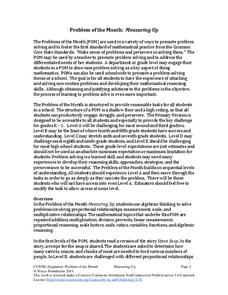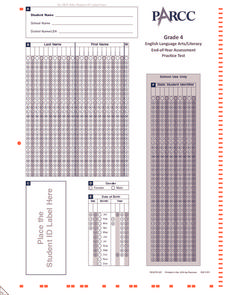Curated OER
Understanding the Four Forces of Flight
In this four forces of flight worksheet, students read a 1 page article on flights, answer 5 questions with multiple choice answers, draw a line to connect the four forces to their definitions and answer 1 short answer scenario.
Curated OER
Of Mice and Men: Viewing Guide
In this Of Mice and Men viewing guide worksheet, students study movie terminology as they read brief descriptions and respond to 26 short answer questions as the watch the film based on Steinbeck's novel.
Curated OER
Tissues
In this tissue learning exercise, students are given notes on 6 types of epithelial tissues, 10 examples of connective tissue, three types of muscular tissue and the components of nerve tissue.
Curated OER
Solving Equations
For this algebra worksheet, 11th graders solve a variety of problems using linear and quadratic properties as they pertain to functions. There are 12 questions.
Curated OER
Quadratic Functions
In this algebra worksheet, learners graph quadratic functions and identify the vertex, axis of symmetry, maximum and minimum and intercepts. There are 7 questions.
Curated OER
Solving Rational Equations
In this algebra worksheet, 11th graders solve rational expressions, by combining the denominators and making them common. They solve word problems using algebra. There are 10 questions with an answer key.
Curated OER
Solving Fractional Equations
In this algebra worksheet, 11th graders solve irrational functions by identifying the variables and make sure the equation is a true statement. They solve word problems also. There are 12 questions with an answer key.
NASA
Is It Alive?
Determining whether or not something is living can be more difficult than it seems. Put your young scientists to work defining their own criteria to identify life, then work with three samples to see if they are alive or not.
Curated OER
St. Patrick’s Day
Combine math, creative writing, and leprechauns in a fun St. Patrick's Day activity! Using a bag of gold coins and marshmallows, kids write a math story about a leprechaun that includes a multi-step equation to solve.
EngageNY
Relationships Between Two Numerical Variables
Working in small groups and in pairs, classmates build an understanding of what types of relationships can be used to model individual scatter plots. The nonlinear scatter plots in this lesson on relationships between two numerical...
Rochester Institute of Technology
Artificial Hearing
Your sense of hearing depends upon tiny hairs deep inside your ear and if you lose these hairs, you lose your hearing. Here, groups explore hearing through the decibel measurement of common sounds. As a class, participants discuss...
EngageNY
Introduction to Simultaneous Equations
Create an understanding of solving problems that require more than one equation. The lesson introduces the concept of systems of linear equations by using a familiar situation of constant rate problems. Pupils compare the graphs of...
Noyce Foundation
Cut It Out
Explore the mathematics of the paper snowflake! During the five lessons progressing in complexity from K through 12, pupils use spatial geometry to make predictions. Scholars consider a folded piece of paper with shapes cut out. They...
Noyce Foundation
Measuring Up
Teach the basics of measurement and conversion with a five-lesson resource that builds an understanding of proportion and measurement conversion from elementary through high school. Initially, young scholars use ratios to determine soup...
Education Development Center
Interpreting Statistical Measures—Class Scores
Explore the effect of outliers through an analysis of mean, median, and standard deviation. Your classes examine and compare these measures for two groups. They must make sense of a group that has a higher mean but lower median compared...
Education Development Center
Consecutive Sums
Evaluate patterns of numbers through an engaging task. Scholars work collaboratively to determine a general rule reflecting the sum of consecutive positive integers. Multiple patterns emerge as learners explore different arrangements.
Towson University
The Wildlife Forensics Lab
Can science put an end to the poaching of endangered species? Show your young forensic experts how biotechnology can help save wildlife through an exciting electrophoresis lab. Grouped pupils analyze shark DNA to determine if it came...
Macmillan Education
Time Management
A valuable skills lesson for all grade levels and subject areas, encourage your learners to consider how they are spending their time throughout the day and offer tips for prioritizing and managing daily tasks.
National Security Agency
Awesome Area - Geometry and Measurement
Break out those math manipulatives, it's time to teach about area! Capturing the engagement of young mathematicians, this three-lesson series supports children with learning how to measure the area of squares, rectangles, and other...
Macmillan Education
What Do You See?
Encourage learners to develop greater self-awareness and an understanding of perception versus reality. Here you'll find a life skills lesson that includes worksheets, discussion, and brainstorming activities on the topic of how we see...
Curated OER
One-Variable Inequality Word Problems
Here is a great set of eight scenarios that require the writing of a one-variable inequality and then solving to find the solution. This inequality word problem activity is then followed by the solutions to each of the eight problems.
Curated OER
End-of-Year Practice Test (Grade 4 ELA/Literacy)
The time has come to find out what your fourth grade readers have learned after another year of hard work. This Common Core-designed practice assessment provides two reading passages, one narrative and one expository, that children must...
Library of Congress
Determining Point of View: Paul Revere and the Boston Massacre
If you're teaching point of view, this is the lesson for you! First, decipher the writer's point of view from a primary resource, then compare and contrast the primary source with a secondary source to explore the Paul Revere's engraving...
Achieve
False Positives
The test may say you have cancer, but sometimes the test is wrong. The provided task asks learners to analyze cancer statistics for a fictitious town. Given the rate of false positives, they interpret the meaning of this value in the...

























